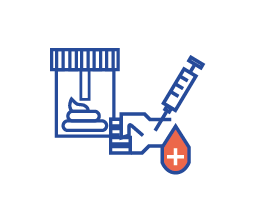
Understanding Helicobacter Pylori (Hp)
Helicobacter pylori (Hp) is a widespread pathogen, affecting approximately half of the world’s population. Infections are typically acquired during childhood, especially in densely populated areas with inadequate sanitation.
Due to its association with non-cardia gastric cancer and mucosal-associated lymphoid tissue lymphoma, Hp has been classified as a Group 1 carcinogen (like smoke for lung cancer).
Early detection is crucial to prevent the infection from developing into cancer and other serious health complications.

The CPW Pilot Study for Hp
The CPW Intervention focuses on the early detection of Hp through blood sample and stool antigenic test, identifying subjects at higher risk of gastric cancer, with possibility of primary prevention through Hp eradication.
Intervention Breakdown
Step by step
When you attend your health surveillance visit…
You will complete an informed consent and a questionnaire to complete the enrolment.

You will undergo a screening test designed to
identify the presence of Helicobacter pylori.

Your household members will be informed about this infection and recommended to undergo a test to detect Helicobacter pylori.







